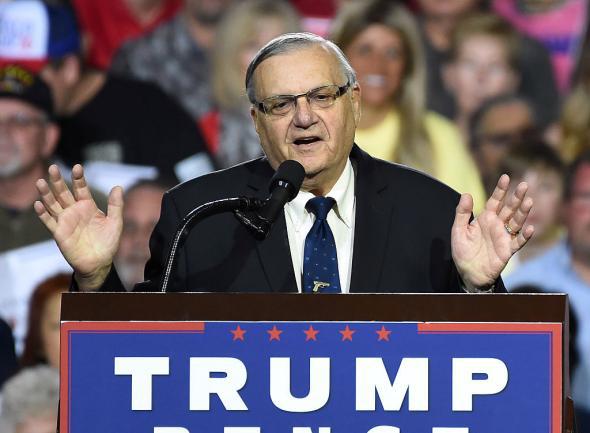Joe Arpaio was the sheriff of Maricopa County, Arizona, for more than two decades, during which he developed a national reputation for his hostility toward undocumented immigrants. In 2011, a federal judge told Arpaio’s department that it could no longer stop and detain Latinos whom officers suspected of no crime besides being in the U.S. illegally—which in practice seems to have simply meant “stopping random Latinos.” From a 2011 Justice Department report about the Maricopa County Sheriff’s Office, or MCSO:
Based upon our extensive investigation, we find reasonable cause to believe that MCSO engages in a pattern or practice of unconstitutional policing. Specifically, we find that MCSO, through the actions of its deputies, supervisory staff, and command staff, engages in racial profiling of Latinos; unlawfully stops, detains, and arrests Latinos; and unlawfully retaliates against individuals who complain about or criticize MCSO’s policies or practices.
Latino drivers in Maricopa County were “four to nine times more likely to be stopped than similarly situated non-Latino drivers,” the DOJ found. In any case, Arpaio announced that his department would not modify its practices, and it didn’t; in 2016 a federal judge found him guilty of misdemeanor criminal contempt of court, which is punishable by up to six months in jail.
On Tuesday night, Donald Trump held a 2020 campaign rally (seriously, that’s what it technically was) in Phoenix. He strongly suggested that he would pardon Arpaio:
I’ll make a prediction. I think he’s going to be just fine, OK? But—but I won’t do it tonight, because I don’t want to cause any controversy. Is that OK? All right? But Sheriff Joe can feel good.
Indeed, a CNN correspondent now reports that the legal groundwork for a pardon is being laid.
Enforcing the Fourth Amendment: Not, apparently, a top Trump administration law-and-order priority.
